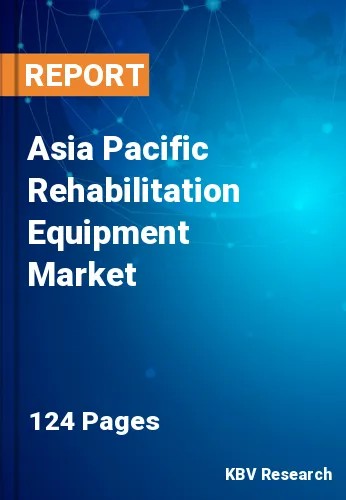The Asia Pacific Rehabilitation Equipment Market would witness market growth of 8.3% CAGR during the forecast period (2023-2029).
A growing number of government laws are being enacted to reduce the duration and expense of healthcare procedures. Providing services at a patient's home is often more cost-effective than in an institution, especially if informal care is utilized efficiently. In addition, with the advancement of new technologies such as remote patient monitoring, the home care category is anticipated to expand significantly over the next few years.
In the future, the rising need for home care will boost the demand for equipment required to treat patients in home care settings, such as patient transfer devices, mobility aids, and medical beds, providing more growth opportunities for the market.
Various rehabilitation equipment, including mobility solutions (such as wheelchairs and patient lifts), are utilized in healthcare institutions. The objective of healthcare institutions is to provide optimal care without exposing their employees to risk. As a result, the need for equipment such as slings, patient lifts, and wheelchairs has increased, consequently enhancing the market's sales growth.
Japan has one of the highest average life expectancies in the world, with women living an average of 87.32 years and men living an average of 81.25 years. At the same time, cause-of-death data from Japan shows that, during and after World War II, there was a big change from communicable diseases to non-communicable diseases (NCDs), like cancer and heart and brain diseases. Nearly 82% of all deaths in Japan are caused by NCDs, which shows this problem's importance. Focusing on disability-adjusted life years (DALYs), which is a way to measure the health loss caused by an illness or injury (disease burden), the disease burden is hugely disproportionate for cardiovascular disease, cancer, mental illness, mental disorders, and chronic musculoskeletal disorders. This will fuel market expansion.
The China market dominated the Asia Pacific Rehabilitation Equipment Market by Country in 2022, and would continue to be a dominant market till 2029; thereby, achieving a market value of $2,698.3 million by 2029. The Japan market is experiencing a CAGR of 7.7% during (2023 - 2029). Additionally, The India market would exhibit a CAGR of 9% during (2023 - 2029).
Based on Application, the market is segmented into Physiotherapy, Occupational Therapy and Others. Based on Product Type, the market is segmented into Mobility Aids, Daily Living Aids, Exercise Equipment and Body Support Devices. Based on Mobility Aids Type, the market is segmented into Wheelchairs, Scooters and Walking Aids. Based on Daily Living Aids Type, the market is segmented into Medical Beds and Bathroom, Toilet Assist Devices & Others. Based on Exercise Equipment Type, the market is segmented into Upper Body Exercise Equipment and Lower Body Exercise Equipment. Based on Body Support Devices Type, the market is segmented into Patient Lifts and Medical Lifting Slings. Based on End User, the market is segmented into Hospitals & Clinics, Rehabilitation Centers and Homecare Settings. Based on countries, the market is segmented into China, Japan, India, South Korea, Singapore, Malaysia, and Rest of Asia Pacific.
Free Valuable Insights: The Worldwide Rehabilitation Equipment Market is Projected to reach USD 32.3 Billion by 2029, at a CAGR of 7.4%
The market research report covers the analysis of key stake holders of the market. Key companies profiled in the report include Invacare Corporation, Ekso Bionics Holdings, Inc., ReWalk Robotics Ltd., Baxter International, Inc., Medline Industries, Inc., GF Health Products, Inc., Drive DeVilbiss Healthcare (Medical Depot, Inc.), Roma Medical Aids Limited, Hospital Equipment Mfg. Co. and Caremax Rehabilitation Equipment Co. Ltd.
By Application
By Product Type
By End User
By Country
Our team of dedicated experts can provide you with attractive expansion opportunities for your business.

